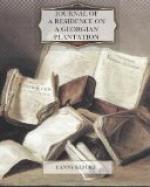She named to me all her children, an immense tribe; and, by the by, E——, it has occurred to me that whereas the increase of this ill-fated race is frequently adduced as a proof of their good treatment and well being, it really and truly is no such thing, and springs from quite other causes than the peace and plenty which a rapidly increasing population are supposed to indicate. If you will reflect for a moment upon the overgrown families of the half-starved Irish peasantry and English manufacturers, you will agree with me that these prolific shoots by no means necessarily spring from a rich or healthy soil. Peace and plenty are certainly causes of human increase, and so is recklessness; and this, I take it, is the impulse in the instance of the English manufacturer, the Irish peasant, and the negro slave. Indeed here it is more than recklessness, for there are certain indirect premiums held out to obey the early commandment of replenishing the earth, which do not fail to have their full effect. In the first place, none of the cares, those noble cares, that holy thoughtfulness which lifts the human above the brute parent, are ever incurred here by either father or mother. The relation indeed resembles, as far as circumstances can possibly make it do so, the short-lived connection between the animal and its young. The father, having neither authority, power, responsibility, or charge in his children, is of course, as among brutes, the least attached to his offspring; the mother, by the natural law which renders the infant dependent on her for its first year’s nourishment, is more so; but as neither of them is bound to educate or to support their children, all the unspeakable tenderness and solemnity, all the rational, and all the spiritual grace and glory of the connection is lost, and it becomes mere breeding, bearing, suckling, and there an end. But it is not only the absence of the conditions which God has affixed to the relation, which tends to encourage the reckless increase of the race; they enjoy, by means of numerous children, certain positive advantages. In the first place, every woman who is pregnant, as soon as she chooses to make the fact known to the overseer, is relieved of a certain portion of her work in the field, which lightening of labour continues, of course, as long as she is so burthened. On the birth of a child certain additions of clothing and an additional weekly ration are bestowed on the family; and these matters, small as they may seem, act as powerful inducements to creatures who have none of the restraining influences actuating them which belong to the parental relation among all other people, whether civilised or savage. Moreover, they have all of them a most distinct and perfect knowledge of their value to their owners as property; and a woman thinks, and not much amiss, that the more frequently she adds to the number of her master’s live stock by bringing new slaves into the world, the more claims she will have upon his consideration




